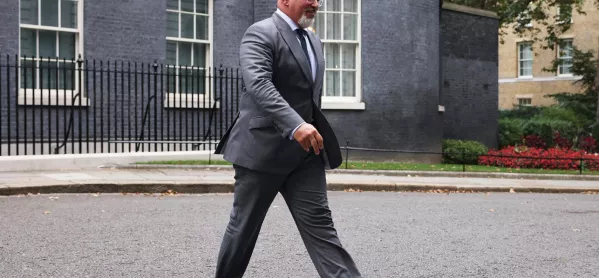‘Not enough black headteachers’ says Zahawi

The number of black headteachers in the country is “not good enough”, the education secretary has said.
Nadhim Zahawi called on school leaders to work with the Government to boost diversity in the workforce.
He said it was “critical” that teaching was an “inclusive profession” to ensure pupils from a variety of backgrounds are represented and motivated.
At the conference of the NAHT school leaders’ union in London, black headteacher Frances Akinde asked the education secretary to commit to removing barriers to leadership and increasing diversity.
Report: Leadership teams should reflect pupil diversity
Analysis: Diversity in schools must start with recruitment
School leadership: How to recruit a more diverse leadership team
Mr Zahawi replied: “School leadership is not representative when it comes to race, and as you say, there aren’t enough black headteachers.
“I’d go further and say there aren’t enough black leaders in the civil service and high echelons of departments across Government and we need to do better there as well.”
Addressing school leaders in Westminster, he added: “I really do think that it’s critical that teaching is an inclusive profession.
“Schools and their leadership teams should reflect their communities and their pupils and I’m absolutely determined to see improvements.
“I think we need inspiring teachers to represent and motivate pupils from all walks of life.”
At the conference, Ms Akinde told the education secretary: “In nearly every room that I enter as a school leader I’m often the only person who looks like me. Even more so when it comes to special education.
“And we all know it’s hard to be what you can’t see. There are currently only around 0.2 per cent of headteachers that are black and female.
“As one of those black female headteachers, I know the work that NAHT and Leaders for Race Equality are doing, but I would like to know what you are committed to doing to remove barriers to leadership and to increase diversity?
Addressing the proportion of black school leaders, Mr Zahawi added: “It’s not good enough. We have got to go further and I hope we’ll do it together.”
He said: ” I want us to make sure that we continue to encourage more black and ethnic minority candidates into the profession.”
The education secretary was also challenged over the real-terms funding pressures facing schools ahead of the spending review later this month.
He said: “Of course I absolutely recognise the difficult discussions that you have to make on a daily basis to make every pound count and is used in the best way to support the children.”
Zahawi won’t set arbitrary academisation target
Mr Zahawi was also asked whether the Government will allow state schools to remain under local authority control rather than convert to an academy.
Addressing school leaders, he said: “I do believe that schools do benefit from being part of a multi-academy trust.”
But the education secretary added: “We’re not going to set an arbitrary deadline to achieve a wholesale structural change.
“But I think the strength of the trust structure, the evidence is pretty clear, I think once again during the pandemic, of how well they were able to respond.”
School leader Catherine Jones called for a “concrete guarantee” from Mr Zahawi that headteachers in maintained schools will be able to decide whether they want to join a multi-academy trust or not.
She told the conference: “We don’t need unwanted, pressurised structural changes in these unprecedented and challenging times. Let us get on with our job.”
The education secretary replied: “I will not set arbitrary timelines.”
Paul Whiteman, general secretary of the NAHT, said: “Broadly, what we heard from Mr Zahawi today was encouraging.
“The real test though, is what he is prepared to do immediately, to prise more investment from the Treasury in the Comprehensive Spending Review, and then how he chooses to develop policy in the coming weeks and months.
“Mr Zahawi took questions on funding, on the move to turn more schools into academies and on the need to see a more diverse group of people becoming school leaders.
“We thank him for his commitment to engage with us and to take an evidence-based approach.
“From my position on the conference platform I saw a real desire from him to be true to his words.”
You need a Tes subscription to read this article
Subscribe now to read this article and get other subscriber-only content:
- Unlimited access to all Tes magazine content
- Exclusive subscriber-only stories
- Award-winning email newsletters
Already a subscriber? Log in
You need a subscription to read this article
Subscribe now to read this article and get other subscriber-only content, including:
- Unlimited access to all Tes magazine content
- Exclusive subscriber-only stories
- Award-winning email newsletters
topics in this article



